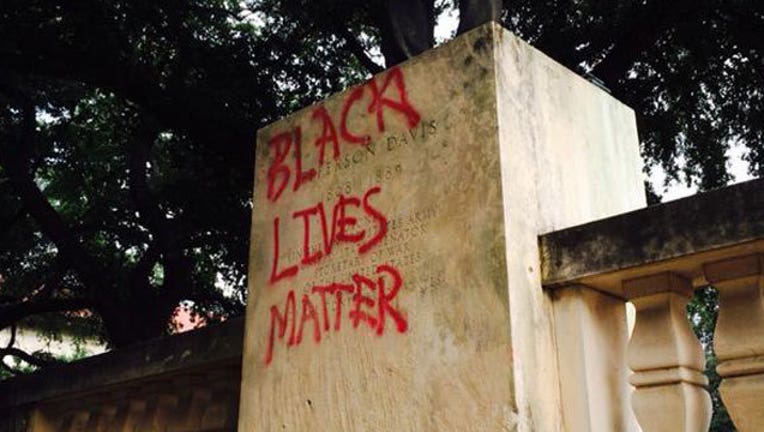Texas judge clears way for removal of Jefferson Davis statue

AUSTIN, Texas (AP) — A judge on Thursday cleared the way for the University of Texas to move a statue of Confederate President Jefferson Davis away from the main area of campus, despite objections from a Southern heritage group that called uprooting the monument a "cultural atrocity" and compared it to the Islamic State destroying ancient artifacts in the Middle East.
Civil rights activists say the nearly century-old bronze likeness of Davis highlights the university's racist past and the statue had been targeted by vandals. New school President Greg Fenves recently ordered it moved to a campus museum, but allowed other Confederate symbols to remain.
The Sons of Confederate Veterans, which earlier this year lost a U.S. Supreme Court decision over rejected Confederate license plates, had sued to prevent moving Davis' statue.
But state District Judge Karin Crump said state law allows the school to determine where to place statuary on its campus. And she noted the original will of benefactor George Littlefield, who commissioned the statue of Davis and others, stated that it be placed in a position of prominence.
Texas will move Davis to the campus Briscoe Center history museum, which also houses one of the nation's largest archives on slavery.
"Putting it in the Briscoe Center, far from whitewashing or erasing history, but puts it in the proper historical context," said Gregory Vincent, Texas vice president for diversity and community engagement.
Vincent said the school would move the Davis statue within the next few days.
The Briscoe Center is near the Lyndon Baines Johnson Presidential Library, which last year hosted a 50th anniversary of the Civil Rights Act. The Travis County courthouse where Thursday's hearing was held is named after Heman Sweatt, the first African-American admitted to the University of Texas law school under court order in 1950.
The school will keep statues of Confederate Gens. Robert E. Lee and Albert Sidney Johnston and Confederate Postmaster General John H. Reagan near the university's central clock tower. Fenves has cited those men's "deep ties to Texas" but said Davis is in a separate category.
The Davis statue had been targeted by vandals and had come under increasing criticism. State government and businesses around the U.S. have removed Confederate symbols following the mass shooting in June of black church members in Charleston, South Carolina.
Vincent, who chaired the university committee that developed recommendations on moving the Davis statue, noted the Charleston shootings.
Kirk D. Lyons, a North Carolina-based attorney for Sons of Confederate Veterans, said he didn't know if the group would appeal Thursday's ruling. Several group members attended the hearing and some wore Confederate battle flag lapel pins or neckties.
Lyons called moving Davis and other efforts to remove confederate symbols a "cultural atrocity." When he asked Vincent if he'd heard comparisons to Islamic State fighters destroying artifacts in the Middle East, the judge stopped him and called it irrelevant.
Lyons said if Texas removes Davis, soon all statues of white figures will be taken down.
"If those statues come off, I'm afraid we'll be signing a death warrant for any other statue except Barbara Jordan and Martin Luther King (Jr.)," Lyons said, referring to the former Texas congresswoman.
Davis' great-great grandson has said he's comfortable with the move. When Texas announced the move earlier this month, Bertram Hayes-Davis called it "appropriate and reasonable."

